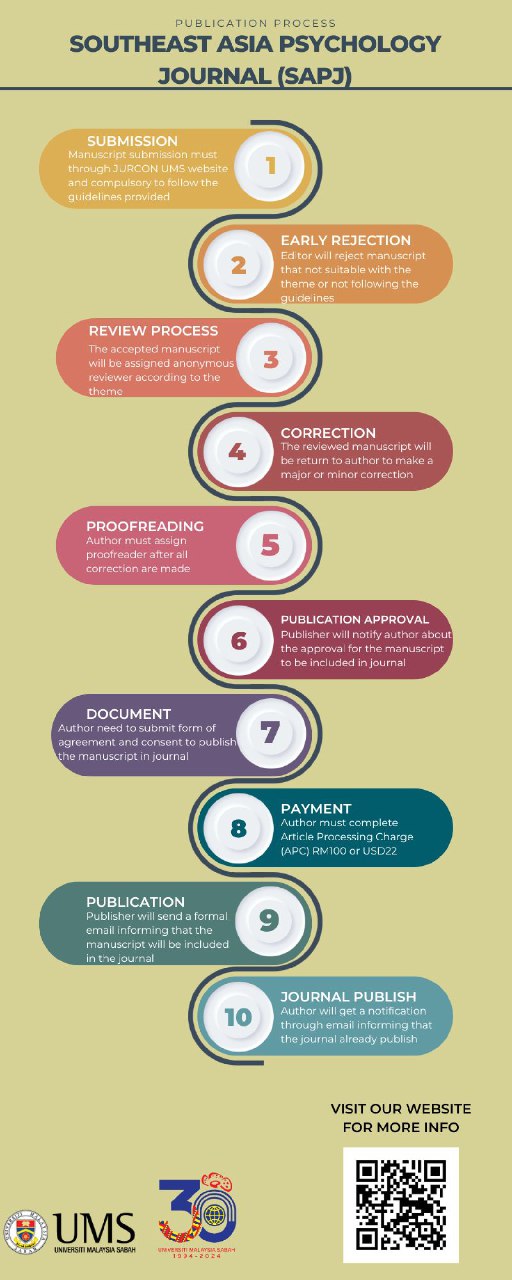AN EXPLORATORY STUDY OF THE SUITABILITY OF HELP-SEEKING, CULTURE AND STIGMA MEASUREMENT AMONG UNIVERSITY STUDENTS
DOI:
https://doi.org/10.51200/sapj.v11i1.4890Keywords:
Test and Testing, Psychometrics, Evaluation, And MeasurementAbstract
There is a rise in the incidence and prevalence of mental distress among university students. However, the rate of mental health service utilisation is low. As psychological help-seeking attitude is a strong predictor for seeking psychological treatment, it is important to validate feasible and psychometrically sound instruments in the Malaysian context. This pilot study aimed to investigate the reliability and validity of six scales measuring the moderating role of culture on the effect of stigma in psychological help-seeking attitudes among university students. An online questionnaire, consisting of 83 items and 6 scales namely, the Portrait Value Questionnaire (PVQ-21), Loss of Face Scale (LOF), Individualism versus Collectivism Scale (INDCOL), Perceptions of Stigmatisation by Others for Seeking Psychological Help Scale (PSOSH), Self-Stigma of Seeking Help (SSOSH), and The Attitudes Toward Seeking Professional Psychological Scale (ATSPPHS-SF) is distributed to a convenience sample of 61 samples from International Islamic University Malaysia. The results of this pilot study indicated that the overall reliability of the questionnaire was Cronbach’s Alpha 0.90. The Cronbach Alpha value for the total of all measures was found to be highly reliable. A factor analysis was run to test the validity of the unidimensional scales, and the results ranged from KMO value 0.63 to 0.84 with Bartlett’s p-value for all scales being significant (p <0.00). Validity of multidimensional scales were tested with convergent validity analysis. Both the INDCOL and PVQ-21 showed a good convergent validity and is a valid tool. The instruments used in this pilot study can be used for the main research study in studying the moderating role of culture on the effect of stigma in psychological help-seeking attitudes among university students as the instruments are multiculturally competent. Therefore, in a multicultural population like Malaysia, instruments as such are found to be helpful in studying the effects of culture, stigma, and personal values on psychological help-seeking attitudes.
References
Atkinson, N. W. (2007). Chinese and North American college students' attitudes toward seeking professional psychological help: gender and ethnic comparisons (Doctoral dissertation, Humboldt State University). http://hdl.handle.net/2148/168
Atkinson, D.R., & Gim, R.H. (1989). Asian-American cultural identity and attitudes toward mental health services. Journal of Counseling Psychology, 36(2), 209-212.
Alavi, M., Shafeq, S. M., Geramian, S. M., & Ninggal, M. T. (2014). International Students’ Mental Health and Attitude Toward Counselling Centers. Journal of Applied Sciences, 14(16). doi:10.3923/jas.2014.1871.1876.
Bayer, J.K., & Peay, M.Y.(1997).Predicting intention to seek help from professional mental health services, Australia N.Z. Psychiatry,31,504-513,10.3109/00048679709065072
Carson J. Sandy, Samuel D. Gosling, Shalom H. Schwartz & Tim Koelkebeck (2016):The Development and Validation of Brief and Ultrabrief Measures of Values, Journal of Personality Assessment, Doi:10.1080/00223891.2016.1231115
Chong, S. T., Mohamad, M. S., & Er, A. C. (2013). The mental health development in Malaysia: history, current issue and future development. Asian Social Science,9(6),1. https://doi.org/10.5539/ass.v9n6p1.
Chai, M. S. (2000). Fears of Psychological Treatment and Attitudes Towards Seeking Professional Help Among Students (Doctoral dissertation, Universiti Pertanian Malaysia).doi: http://psasir.upm.edu.my/id/eprint/10921
Choi, N.-Y., & Miller, M. J. (2014). AAPI college students’ willingness to seek counseling: The role of culture, stigma, and attitudes. Journal of Counseling Psychology,61(3),340- 351. https://doi.org/10.1037/cou0000027
Chian, C. C. & Louis, G. J. (2009).Cultural values and perceived social support in influencing psychological help-seeking attitudes and behaviors among Malaysian College Students.
Chirkov, V. I., Lynch, M., & Niwa, S. (2005). Application of the scenario questionnaire of horizontal and vertical individualism and collectivism to the assessment of cultural distance and cultural fit. International Journal of Intercultural Relations, 29(4), 469-490.doi: https://doi.org/10.1016/j.ijintrel.2005.05.014.
Cortina, J. M. (1993). What is coefficient alpha? An examination of theory and applications. Journal of Applied Psychology,78(1),98
Davidov, E. Schmidt, P., and Schwartz, S.H., (2008), “Bringing values back in: The adequacy of the European Social Survey to measure values in 20 countries,” Public Opinion Quarterly,1-36.doi: https://doi.org/10.1093/poq/nfn035.
Eui, Ching Sie and Tan, Wei Hong. (2019). The mediating role of self-stigma in perceived public stigma and attitudes toward mental health help-seeking among university students in Malaysia. Final Year Project, UTAR. doi: http://eprints.utar.edu.my/id/eprint/3221
Froio, N. (2013, October 10). Number of university students seeking counselling rises 33%. http://www.theguardian.com.
Flansburg, T. 2012. Factors Involved in College Students’ Use of Counselling Services. Master of Social Work Clinical Research Papers. Paper 23. http://sophia.stkate.edu/msw_papers/23
Fischer, E., & Farina, A. (1995). Attitudes toward seeking psychological professional help:A shortened form and considerations for research. Journal of College Student Development,36(4),368-373.doi:10.1037/t05375-000.
Fischer, E. H., & Turner, J. I. (1970). Orientations to seeking professional help: Development and research utility of an attitude scale. Journal of Consulting and Clinical Psychology, 35(1),79–90. doi:10.1037/h0029636.
Germani, Alessandro & Delvecchio, Elisa & Li, Jian-Bin & Mazzeschi, Claudia. (2020). The Horizontal and Vertical Individualism and Collectivism Scale: Early Evidence on Validation in an Italian Sample. Journal of Child and Family Studies. URL: https://repository.eduhk.hk/en/publications/the-horizontal-and- vertical-individualism-and- collectivism-scale-
Hoque, A. S. M. M. & Awang, Zainudin. (2016). The Sway of Entrepreneurial Marketing on Firm Performance: Case of Small and Medium Scale Enterprises (SMEs) in Bangladesh. URL: https://www.researchgate.net/publication/320808992_The_Sway_of_Entrepre neurial_Marketing_on_Firm_Performance_Case_of_Small_and_Medium_Scale _Enterprises_SMEs_in_Bangladesh
Ibrahim, N., Amit, N., Shahar, S. (2016). Do depression literacy, mental illness beliefs and stigma influence mental health help-seeking attitude? A cross-sectional study of secondary school and university students from B40 households in Malaysia. BMC Public Health 19 (Suppl 4), 544.https://doi.org/10.1186/s12889-019-6862-6
Jacques, P., Bacher, J., & Wetzelhütter, Towards greater validity in Schwartz’s
portrait values indicator using experimental research. Quality & Quantity,50(4),1567-1587. doi: 10.1007/s11135-018-0784-8. Khan, Nasima Rahman. (2020). "Assessing differentiation of self in multiple cultural contexts: Initial validation of the Multicultural Differentiation of Self Inventory (MDSI)”. University of New Orleans Theses and Dissertations. 2796. https://scholarworks.uno.edu/td/2796 on 8 August 2022.
Kotera, Y., & Maughan, G. (2020). Mental health of Irish students: self-criticism as a complete mediator in mental health attitudes and caregiver identity. Journal of Concurrent Disorders. doi: 10.54127/BHNM9453.
Kotera, Y., Ting, SH. & Neary, S. (2021). Mental health of Malaysian university students: UK
comparison, and relationship between negative mental health attitudes, self-compassion, and resilience. High Educ 81, 403–419.https://doi.org/10.1007/s10734-020-00547-w
Kok, J. K., Low, S. K., Lee, M. N., & Cheah, P. K. (2012). The provision of counseling services in the secondary schools of Perak state, Malaysia. International Proceedings of Economics Development & Research, 31. Kumaran, V., Ismail, M., Thinagar, S., & Roslan, S. (2022). Mental Health Disorder among Malaysian Universities Students during COVID-19 Pandemic. Asian Journal of University Education, 18(3), 735-744.doi:10.24191/ajue.v18i3.18965
Leong, F. T., & Lau, A. S. (2001). Barriers to providing effective mental healthservices to Asian Americans.Mental Health Services Research,3(4),201-214. http://dx.doi.org/10.1023/A:1013177014788
Livingston, S. A. (2018). Test reliability—Basic concepts (Research Memorandum No. RM-18-01). Princeton,Educational Testing Service. https://onlinelibrary.wiley.com/doi/pdf/10.1002/ets2.12296 on 8 August 2022. Li, J., Marbley, A. F., Bradley, L. J., & Lan, W. (2016). Attitudes toward seeking professional counseling services among Chinese international students: Acculturation, ethnic identity, and English proficiency. Journal of Multicultural Counseling and Development,44(1),65-76.https://doi.org/10.1002/jmcd.12037 Mohan, S.B.V. & Sorooshian, Shahryar. (2012). Counseling in the context of Malaysian living style. Australian Journal of Basic and Applied Sciences. 6.292-296 Maki, M. T., & Kitano, H. H. (2002). Counselling Asian Americans. Counselling Across Cultures,5,109-131. Miller, M. J., & Sheu, H. (2008). Conceptual and measurement issues in multicultural psychology research. In S. D. Brown & R. W. Lent (Eds.),Handbook of counseling psychology (4th ed., pp. 103–120). Wiley Ministry of Health. (2016). Press statement by Minister of Health Malaysia. Author. http://www.moh.gov.my/english.php/database_stores/store_view_page/22/451. Mojaverian, T., Hashimoto, T., & Kim, H. S. (2013). Cultural differences in professional help seeking: A comparison of Japan and the U.S. Frontiers in Psychology,3(615),1-8. doi:10.3389/fpsyg.2012.00615 Palmer, Geoffrey J. (2009). "Examination of the Reliability and Validity of the Attitudes Toward Seeking Professional Psychological Help Scale (ATSPPHS) among Jamaican Americans."doi:https://digitalrepository.unm.edu/educ_ifce_etds/1. Ponterotto, J. G., & Ruckdeschel, D. E. (2007). An overview of coefficient alpha and a reliability matrix for estimating adequacy of internal consistency coefficients with psychological research measures. Perceptual and Motor Skills, 105, 997–1014.doi: 10.2466/pms.105.3.997-1014. Picco.L, Abdin.E, S. A. Chong, S. Pang, S. Shafie, B. Y. Chua. (2016). Attitudes Toward Seeking Professional Psychological Help: Factor Structure and Socio-Demographic Predictors.doi: https://doi.org/10.3389/fpsyg.2016.00547. Rayan, A., & Jaradat, A. (2016). Stigma of mental illness and attitudes toward psychological help- seeking in Jordanian university students. Research in Psychology and Behavioral Sciences,4(1),7-14. doi: 10.12691/rpbs-4-1-2. Salim, S. (2010). Psychological help seeking attitudes among Malaysian college and university students. Procedia Social and Behavioral Sciences,5,426–430.doi: https://doi.org/10.1016/j.sbspro.2010.07.117 Singelis, T. M. (1994). The Measurement of Independent and Interdependent Self-Construals. Personality and Social Psychology Bulletin,20(5),580–591.doi: https://doi.org/10.1177/0146167294205014 Sim, S., Sim, H., & Quah, C. (2021). Online Learning: A Post Covid -19 Alternative Pedagogy for University Students. Asian Journal of University Education (AJUE), 16(4), 137-151. https://doi.org/10.24191/ajue.v16i4.11963 Soheilian, Sepideh & Inman, Arpana. (2009). Middle Eastern Americans: The effects of stigma on attitudes toward Counseling.Journal of Muslim Mental Health.4.139-158. 10.1080/15564900903245766. Streiner DL (2003). Starting at the beginning: An introduction to coefficient alpha and internal consistency. Journal of Personality Assessment, 80(1),99–103.doi: 10.1207/S15327752JPA8001_18 Surapaneni, S. (2015). Psychological distress and attitudes toward seeking help for personal and career counseling: The contributions of public and self-stigma (Master’s thesis). doi:https://lib.dr.iastate.edu/cgi/viewcontent.cgi?article=5724&context=etd
Teegavarapu, Ramesh. (2019). Methods for Analysis of Trends and Changes
in Hydroclimatological Time-Series. doi: 10.1016/B978-0-12-810985-4.00001-3 Triandis, H.C. (1988). Collectivism and individualism: A reconceptualization of a basic concept in cross-cultural social psychology. In G.K. Verma& C. Bagley (Eds.), Personality, attitudes, and cognitions (pp. 60-95). Macmillan Van OS, J., McKenzie, K., & Jones, P.(1997).Cultural differences in pathways to care, service use and treated outcomes.Current Opinion Psychiatry,10,178-182
Vogel, D. L., Heimerdinger-Edwards, S. R., Hammer, J. H., & Hubbard, A. (2011). “Boys don’t cry”: Examination of the links between endorsement of masculine norms, self-stigma, and help-seeking attitudes for men from diverse backgrounds.Journal of Counseling Psychology, 58, 368- 382. doi:10.1037/a0023688
Vogel, David & Wade, Nathaniel & Ascheman, Paul. (2009). Measuring Perceptions of Stigmatization by Others for Seeking Psychological Help: Reliability and Validity of a New Stigma Scale with College Students. Journal of Counseling Psychology. 56.301-308. doi:10.1037/a0014903.
Vogel, D. L., Wade, N. G., & Hackler, A. H. (2007). Perceived public stigma and the
willingness to seek counseling: The mediating roles of self-stigma and attitudes toward counseling. Journal of Counseling Psychology,54(1),40–50.https://doi.org/10.1037/0022-0167.54.1.40
Vogel, D. L., Wade, N. G., & Haake, S. (2006). Measuring the self-stigma associated with seeking psychological help. Journal of Counseling Psychology, 53(3),325- 337. doi:10.1037/0022-0167.53.3.325 Wasti, S. A. (2003). The influence of cultural values on antecedents of organisational commitment: An individual-level analysis. Applied Psychology: An International Review,52(4), 533–54. doi: https://doi.org/10.1111/1464-0597.00150. Yin-Fah, B. C., Sok-Foon, Y., & Migin, M. W. (2016). Counselling Services Utilisation in a Malaysia Private University. International Education Studies,9(3),53. https://doi.org/10.5539/ies.v9n3p53 Zane, N., & Yeh, M. (2002). The Use of Culturally Based Variables in Assessment: Studies on Loss of Face. Asian American Mental Health, 1–18.https://doi.org/10.1007/978-1-4615- 0735-2_9. Zane, N., Sue, S., Hu, L., & Kwon, J. (1991). Asian American assertion: A social learning analysis of cultural differences. Journal of Counseling Psychology,38,63-67.Doi: 10.1037/0022-0167.38.1.63. Zhang, N., & Dixon, D.N.(2003).Acculturation and attitudes of Asian International students towards seeking psychological help,Journal Multicultural Counseling,Dev,31,205-222,doi:https:doi.org/10.1002/j.2161-1912.2003.tb0054.x







